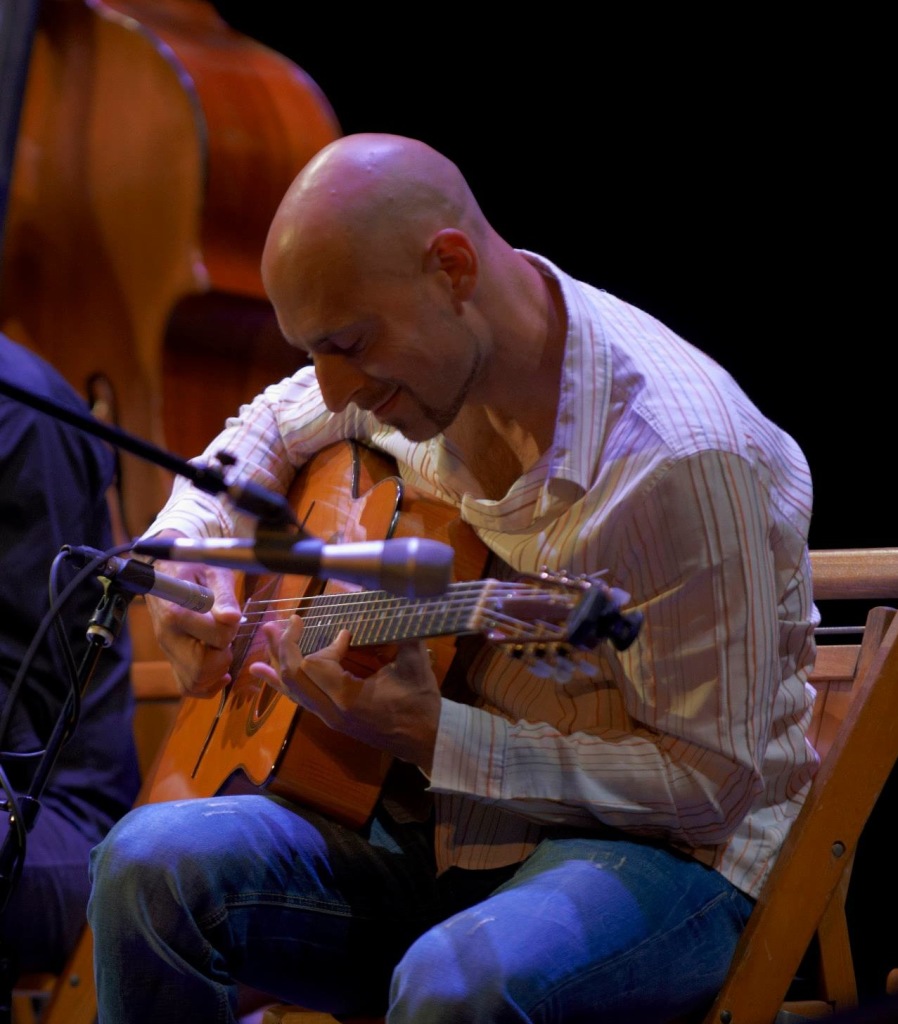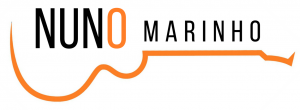Italian Gypsy Jazz guitarist, blogger of “Diary Of a Gadjo”, teacher and composer Dario Napoli opens his heart and mind in this thoughtful, conscious and inspiring interview.
Here it is: “Cotto a puntino” 🙂
1 – What have inspired you to start playing music? Tell us about your influences and what was going on around you at the time.
My first inspiration to play music was my brother, he’s two years and a half older than me and introduced me to all the first music I listened to. At 12 he then brought me to my first live concert, which was Eric Clapton, where I absolutely decided I needed to learn how to play.
And so for the following 3 years I started by ear on a very cheap classical guitar, copying what I could from the Beatles, Eric Clapton, BB King, Jimi Hendrix, SRV, etc.
The years I began playing I was living in Milan which was very alive as a music city, and so there was a lot of inspiration from concerts, great musicians and started getting into jazz thanks to my first “real” teacher, Gianpiero Spina.
At 18 I went to college in New Orleans and immersed myself in jazz but always continued with blues, rock and fusion, and then came Django, who revolutionized my world 🙂
2 – What are your current projects and future goals?
My main project is my solo project, Dario Napoli Modern Manouche Project, with which I have recorded 2 albums and now working on a third.
I also have various collaborations, a duo with a singer (closer to a Joe Pass-Ella Fitzgerald idea) and an electric quartet with drums and hammond/electric piano.
But gypsy jazz is my main thing and my goal is to have a successful touring and recording career.
3 – You’ve spent a lot of time and energy on transcriptions. What would you consider to be the greatest impact of transcribing regarding ear training and technique?
I’ve basically never stopped transcribing since I was 12 years old, only in the last few years I’ve been able to share my transcriptions but it’s something that I’ve been doing for myself and continue to do for myself constantly as I believe it is the more efficient way to learn.
If we think back on how we learned our own mother language, we basically copied our parents and our friends and then in school they explained the grammar, but we already knew how to speak based on whom we copied or heard.
The same in music, if we want to learn a language we have to copy and then we can develop our own vocabulary over time.
4 – You have studied “The Boss” Bireli Lagrene’s language like no other. What makes Bireli sound so distinctive and appealing to our ears? What are his trademarks and aspects one must be aware?
Well, ever since I started playing I’ve been attracted and inspired by many different kinds of music and so I’ve always tried to develop as much versatility as possible.
Bireli for me is the most amazing example of versatility and proficiency in many different styles (and actually, even many different instruments!), so I felt very naturally attracted by his style and his ability to incorporate all the music that he has listen to over the years.
The thing I really like the most of him is his timing and his rhythmical ideas (not only strictly Le Pompe rhythm which is obviously great), but his comping, where it’s always a surprise in terms of harmony and rhythmic fills and patterns, both on electric and acoustic.
5 – Jazz musicians often fear transcriptions because of the risk of loosing their own musical personality. But in Gypsy Jazz probably every note played by Django has already been transcribed. What are your thoughts on this?
Yes, I believe the best thing is a balance. Transcribing is inevitable because it’s just like learning a language: you have to copy whoever speaks that language to get started. We all do it, whether it is language of music.
As we get more proficient we will naturally develop our own unique feel and language. Even Django wasn’t born in a vacuum, he played with great accordion players and he also copied and was inspired by the great American Jazz musicians of his time, as well as Debussy and Ravel and other classical masters. Then he filtered everything through his sensibility and experience, but all those influences are very important.
6 – Regarding your online business teaching and transcribing site, how did it happened? How do you manage a successful teaching site?
It all started with the idea that it was easy with the Internet to share what I was already doing for myself.
A few years back I started studying and reading about music business and the importance of having a website and it was pretty natural to simply share all that. I was studying through the website. This got people interested and started inquiring about my teaching.
Teaching is something I’ve always enjoyed doing honestly also for selfish reasons 🙂 it makes me a better musician. It makes me focus on details and constantly review what I consider the important elements of music.
This year, here in Tuscany, from May 19-23, I will be also hosting my first gypsy jazz guitar camp and I’m very excited that several people are participating. I cannot wait to be there!
7 – About your guitar practice what motivates you to keep going?
I understood many years ago that you can start your path in music but there’s never an arrival point if you truly want to keep improving, so it does not scare me that I will never be truly “satisfied” 🙂
I really enjoy the process and attaining my goals on the guitar is one of the greatest satisfactions in life. Being able to share them with others then is paradise 🙂
8 – How do you balance work and rest? How long are your working sessions and pauses?
In reality I am very bad at balancing work and rest in the sense that music pretty much never makes me tired.
Of course, I have to be careful with my hands to not overplay but luckily being a musician today is not just about playing and practicing many hours a day but also being an entrepreneur and dealing with technology, website, marketing, public relations etc.
So basically, when I’m not practicing, which is still several hours a day, I’m doing all the other aspects of a musician’s life.
9 – Do you remember your practice process when you started playing? How much did it change through the years?
When I started, it was all about hearing and reproducing. Although I still do that, I also have phases when I give more importance to one aspect of music or another, it can be harmony, or rhythm, or an element of a different style or just simply, a technique.
10 – Tell us about your routines. How does a regular day in your life looks like?
So, assuming I don’t have a gig or I’m not teaching (which changes things) I will typically start out the day working on a specific technique or a series of specific techniques.
Afterwards I would pick one standard and work on that, arranging, improving, chord solo, trying to look at it from all aspects possible, and changing keys. That usually takes up the whole morning.
Early afternoon I usually go for a walk or a bike ride or something physical and then if I have the time, I will repeat the same process of the morning or get into composing or arranging.
If I don’t have time in the day I will do the website and the music business stuff in the evening.
11 – What were the biggest challenges you have faced in order to progress in your practice, performance and musical career?
Well, although I have been playing and practicing intensely since I was 12 years old, I only accepted internally to be a full-time musician around 30. It took me a while to get over the social conditioning that music is something that is hard to live on and hard to pursue.
Once the decision was made, the hard part is to understand that music is only one element necessary to make it; just like an entrepreneur there are many things that one must do away from the instrument in order to create the foundation to continue playing the instrument for a living.
12 – Do you feel that balancing musical skills and the entrepreneur and social aspects around the music the hardest thing to handle? I mean, there’s always excellent musicians that aren’t able to persevere because they don’t know (or enjoy) how to sell their music; others are excellent businessmen lacking musical qualities.
Yes, but for me also doubts, self-doubts creep in at times, but daily practice and faith help!
If it were up to me, I would simply wake up and play guitar all day, which I still sometimes do 🙂 but the reality is that I have to carry out, or delegate tasks, and that means time away from the music and that’s not always easy.
13 – What do you value the most in the music/musicians you love to listen? What key ingredients you love to hear when listening to some new album, musician or student?
The thing that I’m most attracted to when it comes to music is actually harmony. A close second is rhythm, and so when I listen to musicians I notice I’m attracted to musicians that have an evolved sense of harmony and that are very versed and confident rhythmically.
14 – Do you meditate? Do you perform any kind of practice or activity that pulls you towards a more focused, clear or mindful state?
I feel like my meditation is my practice; when I’m on the instrument through repetition my mind stays in one place and time becomes absolutely irrelevant.
So I don’t meditate per se but I believe I can relate to the process. Otherwise, playing tennis, basketball or biking, when I have the time, are important for me mentally and physically.
15 – You’re the first GJ musician I meet that actually plays Basketball! Are you an NBA fan? Who are your top 5 players ever? My personal choice would be John Stockton, Michael Jordan, Scottie Pippen, Charles Barkley and Hakeem Olajuwon :p
SO COOL, I love basketball!! I played some intramural in the US but my main sport was tennis, where I played NCAA championship. When we meet I would be thrilled to shoot around and steal some tips form you!
Ah, my TOP 5: MICHAEL JORDAN, SCOTIE PIPPEN, ISIAH THOMAS, LARY BIRD, KAREEM ABDUL-JABBAR 🙂
16 – What would you consider to be the most important advice someone gave to you?
To listen carefully to the voices that comes up in your mind, to key into one’s emotions and take them seriously, and not repress them.
Also, to find the strength to believe that you can create the life that you desire and imagine for yourself.
17 – What would you like to be acknowledged for? What’s the most important aspect of your life’s journey that you’d like people to remember?
That, against all odds and contrary to popular belief, one can become an accomplished musician, jazz and gypsy jazz guitarist even later in life. That it’s not just words when they say it’s never too late to become what you were meant to become, if you truly believe (and follow with the actions) that something was meant for you.
18 – Like myself, you started as full-time musician at about the same age then I: LATE! Personally I fell there is some prejudice and/or disbelief in the Jazz community about this subject, but not so much in the Gypsy Jazz community. The preference and attention seems to go easily to young talented kids. On the other hand, there’s a lot of great, inspiring “older” musicians playing at top level with little or even no recognition at all. A penny for your thoughts on this? 🙂
I’m really hoping you’re right on this one (for us “older” folks)!
19 – What would you say to Django if you had the chance to meet him?
First of all, if he were not aware, I would let him know that he had a much greater influence than even he probably expected on guitar and music in general, and I would thank him for that.
I would also ask him a lot of questions in terms of composition, improvisation and also life in general.
20 – What would be the song that you would always refer in a conversation with Django?
The song I would refer to would be “Melodie Au Crepuscule”.
I asked Dario if he had any “Melodie Au Crespuscule” version of his own. The next day he recorded and uploaded this tremendous video and sent it back to me. Wow! Thank you Dario, you’re fantastic!



